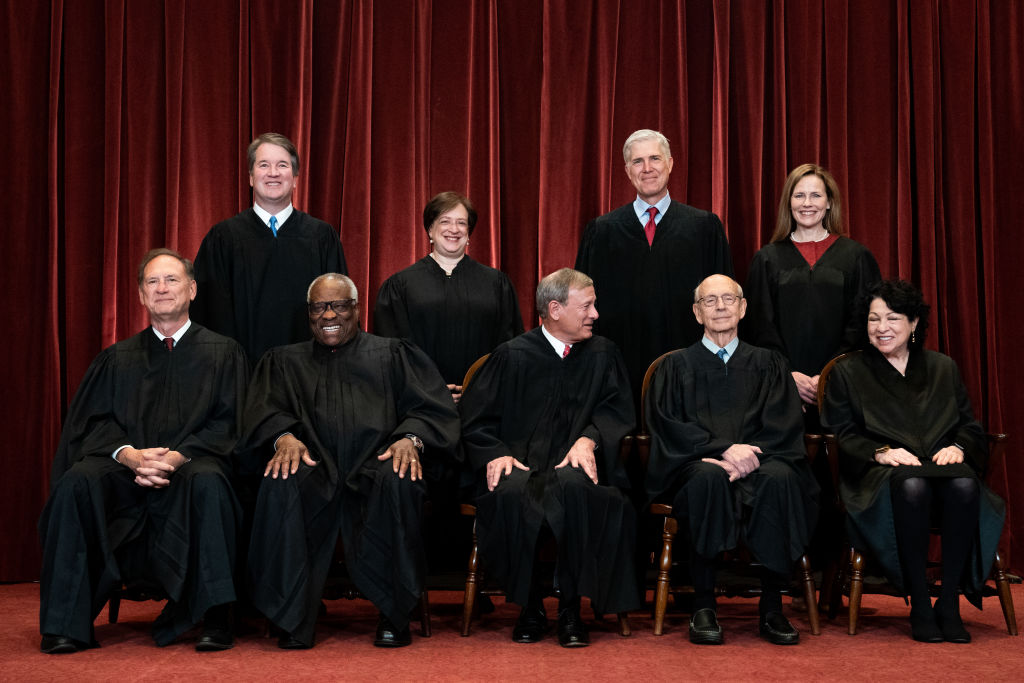This Is the Year: FTC Leads Renewed Effort to Bring Ethics Code to SCOTUS
Also on tap: striking amici and (possibly) banning judicial stock trading
 Fix the Court this winter will lead a renewed effort to bring a formal, written code of conduct to the Supreme Court in light of newly uncovered conflicts of interest at the court and its historically low public approval, coupled with, albeit counterintuitively, the Chief Justice’s recent insistence that there is a “need for the Judiciary to manage its internal affairs.”
Fix the Court this winter will lead a renewed effort to bring a formal, written code of conduct to the Supreme Court in light of newly uncovered conflicts of interest at the court and its historically low public approval, coupled with, albeit counterintuitively, the Chief Justice’s recent insistence that there is a “need for the Judiciary to manage its internal affairs.”
FTC believes that last point is an opening for the Supreme Court to write and adopt a formal ethics code for itself, which, although difficult to enforce, would signal to the country that amid growing concern over the court’s politicization, the justices are at the very least taking their ethical obligations seriously. Justice Kagan in 2019 signaled this possibility but there has yet to be an update. FTC’s work will consist of rallying other nonprofit groups, legal ethicists and members of Congress via a series of discrete actions.
“There is an evident need for a clear, consistent set of principles — a formal ethics code — against which the public can set their expectations of the justices and the justices themselves can measure their own courtroom and extrajudicial activities,” FTC’s Gabe Roth said. “Though I and many others have raised this glaring omission when ethics issues have cropped up over the years, I believe that this is the year SCOTUS adopts a written code of conduct.”
Following last week’s reporting in the New Yorker on the political activities of Ginni Thomas, FTC will also ask SCOTUS to incorporate a rule (29(a)(2)) generally followed by lower courts since 2018, where “a court of appeals may prohibit the filing of or may strike an amicus brief that would result in a judge’s disqualification” — i.e., a brief submitted by a close family member or by a company or organization in which a close family member plays a significant role or has financial ties.
Just yesterday, the court agreed to hear the Harvard and UNC affirmative action lawsuits in which the National Association of Scholars, whose board of advisors Ginni sits on, filed an amicus brief. On Jan. 19, the court took action in a case regarding the Jan. 6 Committee, a body that Ginni and friends said in a letter constitutes “legal harassment [of] private citizens who have done nothing wrong.” And in 2017 and 2018, the years in which President Trump’s ban of foreign nationals from predominantly Muslim countries was before SCOTUS, Ginni had accepted two previously unreported six-figure contracts (p. 8) from one of the case’s amici (Frank Gaffney). Justice Thomas did not recuse in any of these cases.
Thomas’ non-recusals look to be in contrast to the apparent practice of Justice Kavanaugh, who last year recused from two petitions concerning the purported link between Johnson & Johnson’s talc products and ovarian cancer — an issue that the cosmetics-trade association Kavanaugh’s father once ran weighed in on over the years. The latter of the two petitions included an amicus brief from that association.
Meantime, it’s well known that the justices alternately follow and ignore a hodgepodge of ethics standards regarding how they act both in and out of the courtroom. Justices speak at partisan events, accept financial awards and at times fail to recuse themselves from cases involving companies in which they have a financial stake — all practices that would be deemed unethical under accepted canons of judicial ethics.
In September, Justice Alito attacked members of the press and legal academy — even quoting them verbatim as he launched into a broadside, which is fairly threatening when you’re an average citizen — in a now-infamous speech on the shadow docket. In October, Justice Sotomayor seemed to telegraph the results of several upcoming cases when she told a section of the ABA, “There is going to be a lot of disappointment in the law, a huge amount.”
And just this morning, Sotomayor was on “Live with Kelly and Ryan” touting her new children’s book — no issue there — but here we note that like her others it’s published by Penguin RandomHouse, a company whose SCOTUS petitions the justice has not recused from.
FTC has called for a SCOTUS ethics code since its 2014 founding, echoing the work of other nonprofits and legal scholars beginning in 2011. Currently, several congressional proposals would mandate the creation of such a code.
Also this winter, FTC will be looking into whether legislation to ban congressional stock ownership should include judges and/or justices, as there’s a debate in the legal community over whether jurists should simply be encouraged to divest from conflict-inducing securities or there should be an anti-stock mandate.
As this debate progresses, passage of the Courthouse Ethics and Transparency Act, which would require near-contemporaneous reporting of judges and justices’ stock transactions, would be a major step toward greater financial accountability in the third branch. The bill passed the House but has stalled in the Senate.
Currently among the nine justices, only Chief Justice Roberts and Justices Breyer and Alito own individual stocks. Each has made recusal errors due to these investments. A recent Wall Street Journal investigation found 136 judges illegally violated ethics laws by participating in more than 950 cases (up from earlier reporting of 131 judges in 685 cases) in which they had a financial conflict.